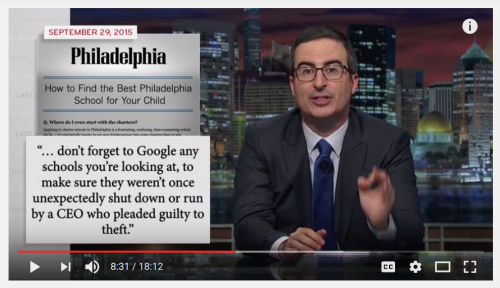This Was The Summer of Charter School Discontent

As summer gives way to Fall, it is worth taking note how shifts, both subtle and substantial, are changing the ground on which charter school advocates fight for more of our public education system. This is not what they are used to. Backed by billionaire financing, using that money to pull the Democratic Party towards education policies more typical of the Republican Party, calling in favors from elected officials who owe their donors, getting unfettered and poorly monitored largess from the federal government, permitted to engage in practices that would land any public school district in a federal civil rights lawsuit, and existing in a regulatory environment that is charitably described as “permissive,” charter schools and their advocates are used to owning the conversation…and pretty much getting their way.
Slowly — but possibly steadily — that is changing.
An early blow actually came last November when current Democratic Party nominee for President Hillary Clinton was campaigning and made an entirely factual observation about the charter school sector as a whole:
“Most charter schools — I don’t want to say every one — but most charter schools, they don’t take the hardest-to-teach kids, or, if they do, they don’t keep them. And so the public schools are often in a no-win situation, because they do, thankfully, take everybody, and then they don’t get the resources or the help and support that they need to be able to take care of every child’s education.”
There is literally nothing inaccurate about that observation. Self selection helps charter schools in general with their student population, and many flatly rig their supposedly open lottery processes. The attrition rates at many charter schools, especially ones that apply incredibly narrow disciplinary regimes to their students, are well established, and the enrollment and financial impacts of these practices on host districts are also well known. Every observation she made in that comment was fundamentally true.
Which did not stop major charter school advocates from lamenting her statement. The pro-charter and hedge fund backed group “Democrats” for Education Reform (DFER) immediately released a response saying, it was “highly disappointing and seemed to reinforce fears about how her endorsements from both major teachers unions would affect her K-12 platform.” This is the same DFER that enthusiastically responded to Secretary Clinton’s campaign announcement, but which apparently has problems with her suggesting that charter schools be held to the same standards as fully public schools and doesn’t want anyone noting how quickly many charter operators purge themselves of students with disabilities, with behavioral needs, or with second language learning needs.
Since then, Secretary Clinton seems to have tried a bit of a pivot, saving her most negative comments for so-called “for profit” charter schools, which, to be fair, are a general disaster zone of a sector. However, as Peter Greene rightly noted in July, this is a distinction in desperate search of a difference. An actual charter school can be a non-profit entity run by a for profit charter management organization (CMO). A non-profit CMO can contract exclusively with for profit vendors that the CMO operators have a financial interest in. Real estate plays abound in the charter school sector, and various investment arrangements allow guaranteed returns for large financial firms. Operating as a not for profit also doesn’t stop charter school administrators from paying themselves extravagantly from the public money they receive.
In fact, these very issues were at the heart of a Last Week Tonight segment by John Oliver. The comedian and social critic was blistering. While explicitly avoiding the debate over the existence of charters and carefully noting that he was looking at the problems associated with a poorly regulated sector taking public funds, Mr. Oliver looked at financial scandals and fraud in charter schools across the country:
This level of scrutiny has been sorely lacking over the quarter century of charter school growth and promotion, but Mr. Oliver was specific and devastating, looking at schools that suddenly shut down without warning, crooked financial arrangements, questionable charter school applications, and oversight laws allowing administrators to select their own non-profit organizations as the legal overseer of their owns charters. Consider the quote in this screen shot warning parents in Philadelphia what to do before selecting a charter school:

Kind of says it all, doesn’t it?
But the charter sector is still only in the denial stage of grieving, so, despite Mr. Oliver’s careful framing of his examination of fraud and mismanagement, the This Was The Summer of Charter School Discontent | Daniel Katz, Ph.D.:

